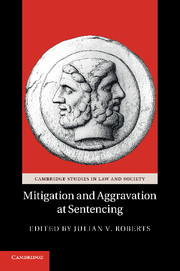Book contents
- Frontmatter
- Contents
- Tables
- Contributors
- Foreword
- Acknowledgments
- Chapter one Punishing, more or less
- Chapter two Re-Evaluating the Justifications for Aggravation and Mitigation at Sentencing
- Chapter three The Search for Principles of Mitigation
- Chapter Four Personal Mitigation and Assumptions about Offending and Desistance
- Chapter Five Intoxication as a sentencing factor
- Chapter Six Beyond the Partial Excuse
- Chapter Seven Equality before the law
- Chapter Eight Personal mitigation
- Chapter Nine Exploring Public Attitudes to Sentencing Factors in England and Wales
- Chapter Ten The Pernicious Impact of Perceived Public Opinion on Sentencing
- Chapter Eleven Addressing Problematic Sentencing Factors in the Development of Guidelines
- Chapter Twelve Proof of Aggravating and Mitigating Facts at Sentencing
- Chapter Thirteen Mitigation in Federal Sentencing in the United States
- Chapter Fourteen The discretionary effect of mitigating and aggravating factors
- Index
- References
Chapter three - The Search for Principles of Mitigation
Integrating Cultural Demands
Published online by Cambridge University Press: 07 September 2011
- Frontmatter
- Contents
- Tables
- Contributors
- Foreword
- Acknowledgments
- Chapter one Punishing, more or less
- Chapter two Re-Evaluating the Justifications for Aggravation and Mitigation at Sentencing
- Chapter three The Search for Principles of Mitigation
- Chapter Four Personal Mitigation and Assumptions about Offending and Desistance
- Chapter Five Intoxication as a sentencing factor
- Chapter Six Beyond the Partial Excuse
- Chapter Seven Equality before the law
- Chapter Eight Personal mitigation
- Chapter Nine Exploring Public Attitudes to Sentencing Factors in England and Wales
- Chapter Ten The Pernicious Impact of Perceived Public Opinion on Sentencing
- Chapter Eleven Addressing Problematic Sentencing Factors in the Development of Guidelines
- Chapter Twelve Proof of Aggravating and Mitigating Facts at Sentencing
- Chapter Thirteen Mitigation in Federal Sentencing in the United States
- Chapter Fourteen The discretionary effect of mitigating and aggravating factors
- Index
- References
Summary
Almost all sentencing decisions contain some reference to mitigating or aggravating factors, yet it is extremely rare to come across a judicial discussion of the rationale or scope of these factors. More to the point, there is very little consideration of mitigation and aggravation from a theoretical perspective. As Ashworth notes, these issues ‘have tended to attract little close examination or theoretical discussion’ (2010: 156). Philosophers have debated some of the issues, but these discussions are, for the most part, limited to arguments about the distinction between mercy and compassion, and their respective relationships with justice. Recently we have also seen efforts by both leading proportionality theorists and their antagonists, the limiting retributivists, to accommodate some sentencing factors in their modes of analysis. While they feel compelled to make this accommodation, neither provides a unified or over-arching theoretical perspective that justifies it. Still, we can learn a lot from their attempts to integrate mitigation and aggravation. The primary lesson is that, from a theoretical perspective, the underlying premises of mitigation and aggravation are elusive.
- Type
- Chapter
- Information
- Mitigation and Aggravation at Sentencing , pp. 40 - 59Publisher: Cambridge University PressPrint publication year: 2011
References
- 3
- Cited by

